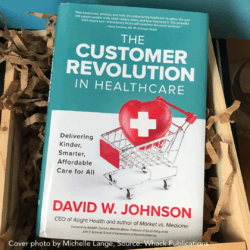September 10, 2019
An American Inquiry: Why I Wrote The Customer Revolution in Healthcare
What convinced a former Peace Corps volunteer and healthcare investment banker like me that the U.S. healthcare system (the System) requires revolutionary overhaul? It really came down to just one question: Why is the System incapable of incremental improvement? The answer to this question led me to write The Customer Revolution in Healthcare: Delivering Kinder, Smarter, Affordable Care for All.
The United States is a big, complex and diverse country. Healthcare constitutes almost twenty percent of the nation’s GDP and is badly broken. In seeking to understand and eliminate the System’s dysfunction, I ventured deeply into America’s revolutionary history, the country’s defining narratives, and our American psyche.
Through this inquiry, it became clear to me that solving America’s healthcare challenges will require uniquely American solutions that reflect our country’s values, culture, history and sense of identity. Let’s get on with it. Why is it so difficult for American healthcare to improve incrementally?
The “Incremental Improvement” Question
The products of almost all human endeavor improve over time. Portable computers illustrate the phenomenon. Introduced in 1982, the first portable Compaq computer was heavy. I know. I had one. It weighed 30 pounds, used two floppy discs, had a small, hard-to-read screen, little computing power and even less memory. It cost $3,590 ($9,250 in today’s dollars). I loved it and carted it all over New York City, even on the subway.
Portable computing has advanced methodically and astronomically since the 1980s. Today, Microsoft’s Surface 2 laptop costs $900, weighs three pounds, has a large touch screen, 8 gigabytes of memory, fast internet connectivity and incredible processing power. Portable computing turbocharges human productivity. It creates value. It makes life better.
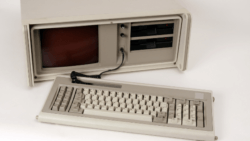
By contrast, healthcare consistently costs more, delivers suboptimal outcomes and offers lousy customer service. The System distorts value creation. It makes life harder. Unlike personal computers, the System fails to incrementally improve. Despite breathtaking medical advances, Americans are sicker than ever and live in fear of catastrophic medical bills.
Here are two high-profile examples of failed attempts to improve healthcare’s productivity.

• Value-Based Payment Programs: with the passage of the 2010 Affordable Care Act (ACA) and the Medicare Access and CHIP Reauthorization Act of 2015 (MACRA), the Centers for Medicare and Medicaid Services (CMS) embarked on an ambitious agenda to test the effectiveness of various payment models. CMS launched a barrage of payment experiments encompassing accountable care organizations, alternative payment models, bundled payments and other forms of riskbased contracts.
When the dust settled, value-based payment programs had failed: CMS saves less than 1% on value-based payment programs; fee-for-service contracts (FFS) still account for almost 90% of provider payment; and healthcare inflation has returned to unacceptably high levels. So much activity; so little value.
• Choosing Wisely: Launched in 2012, Choosing Wisely enlisted 80 medical specialties representing over a million clinicians in an initiative to identify and eliminate unnecessary procedures. After identifying 525 unnecessary procedures, Choosing Wisely undertook a massive campaign to eliminate those procedures and educate the public. They partnered with over 70 consumer and employer groups to spread the word.
Like value-based payment, Choosing Wisely has also bellyflopped. After five years of focused effort, Choosing Wisely failed to meaningfully change physician practices patterns. Unnecessary treatments continue as before. So much effort; so little impact.
The failure of these high-profile initiatives points to a deeper pathology at work to stymie progressive reforms. This pathology is neither new nor unique, but it is extremely virulent.
The Answer: The Healthcare Industrial Complex®
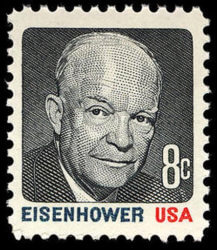
In his timeless Farewell Address to the nation in January 1961, President Dwight Eisenhower coined the term “Military Industrial Complex” to describe an unholy trinity consisting of the Defense Department, Congress and military contractors. This “iron triangle” works in concert to promote its interests at the expense of American society.
Eisenhower emphasized that the Military Industrial Complex’s™ “total influence — economic, political, even spiritual — is felt in every city, every state house, every office of the Federal government.” Then and now, it poses a “grave” threat to “the very structure of our society.”
The “iron triangle” pathology also infects healthcare. In the early 1960s, military and healthcare expenditures constituted 9% and 5% of the US economy respectively. Today, healthcare represents 18% of US GDP, the military only 3%. The Healthcare Industrial Complex™ (the System) is the Military Industrial Complex on steroids.
Healthcare’s “iron triangle” (see graphic) consists of Congress, a massive healthcare bureaucracy and an even more massive healthcare industry. Its participants conspire to drive U.S. healthcare spending ever higher without delivering commensurate health benefits.
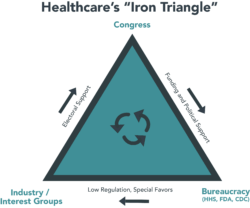
The System sustains itself through market concentration, lax regulatory oversight and influence peddling. It steals resources from more productive sectors of the American economy to feed its voracious appetite. More importantly, the System fails to deliver the health and healthcare services the American people need, want and desire.
Now that we understand what’s really going on, it’s clear that American healthcare requires fundamental, not incremental, change. It requires a customer-led revolution that does the following:
- Obliterates the System in all its manifestations;
- Creates a new American healthcare that delivers kinder, smarter, affordable care for all.
The road to Revolutionary Healthcare begins by acknowledging the oppression the System inflicts on the American people.
Oppression
When Lyndon Johnson signed Medicare and Medicaid into law in 1965, he could not have imagined the tyrannical colossus he was unleashing on the American public. While providing care access to the elderly and poor, the enabling legislation established payment mechanisms and practices that punish the American people and enrich the System’s cronies.
The System executes transactions without customers. Patients visit doctors, doctors prescribe care, patients receive care, and third parties pay for that care. In normal markets, buyers and sellers exchange powerful signals regarding quality, price and service. Healthcare transactions sever this buyer-seller communication, fueling fragmentation and failure.
Like all companies, health companies strive to optimize profits. Absent market signals from customers, health companies respond to perverse incentives embedded within American healthcare’s complex payment formularies. The System’s Fee-for-Service (FFS) payment structure rewards activity, not health outcomes.
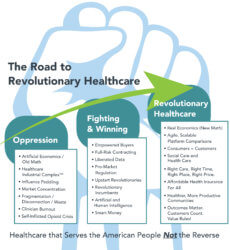
In healthcare’s artificial economy, the System’s payers, providers and suppliers neglect consumers, misallocate resources and generate enormous waste. The result is bloated, error-prone healthcare delivery with out-of-control costs.
The victims of the System’s tyranny include America’s working families and frontline healthcare professionals. Americans are sicker than ever. Middle-class wages are stagnating, in part, because employers have redirected compensation from salaries to cover health insurance costs. Even with health insurance coverage, Americans are now more afraid of paying for treatment than contracting a serious disease.
Declining mortality, declining social mobility, stagnant wages and social isolation are shredding the American dream. Americans are increasingly distrustful of healthcare institutions and frustrated by government’s inability to address their increasingly dire needs. This anger and distrust weaken the social fabric that unites individuals and their communities in their pursuit of the common good. It weakens democracy itself.
Meanwhile, the System is burning out frontline healthcare professionals by forcing them to conduct burdensome administrative procedures, spend less time with patients and meet unrealistic productivity goals. It often takes heroic action for clinicians to address patients’ true healthcare needs. It shouldn’t be so hard to do the right thing.
These grievances are sufficient grounds for a declaration of independence from the System. Many suggest that rationing care services is the only way to control healthcare expenditures. This logic presents a false choice between either unrestricted care access with unrestrained cost growth or restricted care access with controlled cost growth. There is a better way.
Money is not the issue. America devotes 18% of national GDP to healthcare. That is more than enough money to provide superior care services for all Americans. The solution is smarter distribution. U.S. healthcare must allocate resources more effectively and efficiently to improve care outcomes and advance health while reducing overall costs.
Revolutionary Healthcare for All Americans – Now

There’s revolutionary fervor throughout America for overhauling and transforming the nation’s broken healthcare system Revolutionary upstarts and incumbents are jumping the barricades to attack the System’s tyrannical practices. These revolutionaries are fighting powerful and resourceful enemies in every town, city and village. America’s future depends on their success.
This customer-led revolution begins when buyers (governments, companies and individuals) demand more value for their healthcare purchases. Pro-market reforms, enlightened governmental regulation and empowered consumerism are the “force multipliers” propelling this revolutionary reforms. Full-risk payment models (like Medicare Advantage) that reward quality outcomes, service excellence and efficient operations are its disruptive catalyst.
The revolution gains momentum as healthcare consumers become customers (buyers) of healthcare services. The secret ingredient fueling Medicare Advantage’s market success is that individual consumers select the health plan that meets their needs. In response, MA plans tailor their service offerings to consumer/customer demands.
As demand-driven reforms take hold, the System’s inherent weakness and vulnerabilities reveal themselves. Aligning economic incentives and regulatory oversight with patient needs delivers better healthcare outcomes at lower costs with superior customer service.
Enlightened health companies thrive under fair and transparent market conditions. They adapt to consumer needs by reconfiguring business models to kinder, smarter, affordable care. They create a new American healthcare to serve all Americans.
A modern-day customer revolution is remaking one-fifth of the U.S. economy. It is disrupting the System by delivering better, more affordable services to growing numbers of Americans.
Revolutionary Healthcare already has achieved critical mass in select markets. It is spreading quickly. As it progresses, Revolutionary Healthcare will improve the well-being, productivity and life quality of all Americans and their communities. As the revolution unfolds, the following beneficial behaviors will evolve naturally:
- Consumers will make healthcare decisions on their own terms, based on accurate data about their health situations;
- Doctors, nurses and care organizations will be financially incentivized to do right and do good;
- Payers will reward innovative healthcare delivery companies that produce great health outcomes at competitive prices;
- Health insurance plans will strive to keep their members as healthy and “satisfied” as possible;
- Investors will fund companies whose products and services delight customers and best meet market needs; and
- Health companies will leverage consumer-friendly technologies that enhance access, safety, compassion and affordability
- Americans and America will become healthier as individuals and as a nation, liberating resources to pay higher wages, invest in innovation, address other societal challenges and turbocharge productivity.
High-cost, inefficient and impersonal healthcare is not our destiny. Healthcare’s capacity for innovation makes value-based care possible. Healthcare proclivity for waste makes value-based care necessary. Revolutionary Healthcare wins back the trust of the American people by solving their health and wellness needs. It rebuilds communities. It increases social connectivity.
Lost amid healthcare’s vicious politics and artificial economics are millions of vulnerable Americans without the means and resources to navigate a complex and extremely expensive healthcare delivery system. The customer revolution in healthcare is their story, too. Revolutionary Healthcare can declare victory only after it provides affordable healthcare insurance coverage and appropriate, high quality care to all Americans.
The road to revolution is never easy. Revolutionizing healthcare is not for the faint of heart. It inspires disruptive, bottom-up, market-driven and customer-centric competitors who capture market share by conquering inefficient and entrenched business practices. Healthcare revolutionaries win by delivering customers the services they want with great service and transparent, competitive prices.
Revolutionary Healthcare will turn many sacred cows into hamburger. Powerful incumbents will adapt or disappear. New companies will emerge, change lives and thrive. When the dust settles, Revolutionary Healthcare will finally serve the American people and spread health and wellbeing throughout the land.
Are you with us?
Outcomes Matter. Customers Count. Value Rules.
Read about today’s revolutionary forces and leaders in The Customer Revolution in Healthcare, available for purchase on 4sightHealth.com.


